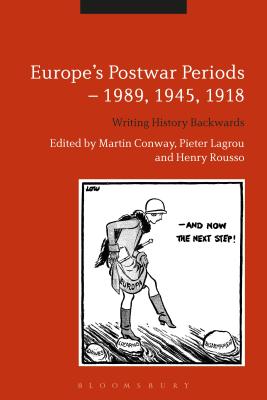

 Bloomsbury Academic
Bloomsbury Academic
Europe's Postwar Periods - 1989, 1945, 1918: Writing History Backwards


Key Metrics
- Martin Conway
- Bloomsbury Academic
- Hardcover
- 9781474276504
- 9.21 X 6.14 X 0.63 inches
- 1.16 pounds
- History > Europe - General
- English
 Secure Transaction
Secure TransactionBook Description
This book brings together world-renowned scholars from all over Europe to analyse how successive Europes have been constructed in the wake of the key conflicts of the period: the Cold War and the two World Wars. By regressively tracing Europe's path back to these pivotal moments as part of a unique methodology, Europe's Postwar Periods - 1989, 1945, 1918 reveals the defining characteristics of these postwar periods and integrates the changes that followed 1989 into a more substantial historical perspective.
The author team address the crucial themes in recent European history on a chapter-by-chapter basis that gives comprehensive coverage to the whole of the European region for topics such as borders, states, empires, democracy, justice, markets and futures.
The volume highlights the fact that Europe was made less by wars than is commonly thought, and more by the nature of the settlements - international, national, political, economic and social - that followed the two World Wars and the Cold War. It is an important, innovative text for all students and scholars of 20th-century European history.
Author Bio
My research has been principally concerned with European history from the 1930s to the final decades of the twentieth century. Like many others, I was initially interested in the inter-war years, and my doctoral thesis explored the history of the extreme-right movement in Belgium, the Rexist movement, during the Second World War.
Published in 1993 as Collaboration in Belgium: Léon Degrelle and the Rexist Movement 1940-1944, it was subsequently published in French and Dutch translations. The Catholic origins of the Rexist movement led me on to develop a wider interest in Catholic politics, and I have published a number of books and articles which have looked more generally at the shape of Catholic politics in Europe.
I have also continued my interest in Belgium, and wrote a large-scale study of Belgium after its liberation in 1944. This was published in 2012 as The Sorrows of Belgium: Liberation and Political Reconstruction 1944-47. It too has come out in a French translation.
In the last few years, much of my work has concerned the history of Democracy in twentieth-century Europe. I have published a number of articles on the nature of democracy in post-war Europe, and published a large book entitled Europe's Democratic Age: Western Europe 1945-68, with Princeton University Press in the spring of 2020.
I am continuing to write about democracy, and am completing a collaborative project on the history of Social Justice in twentieth-century Europe. I have also begun a new project on Political Men, which seeks to problematize the forms of male political citizenship which have developed in Europe across the twentieth century. Its focus is consciously comparative, embracing a variety of political regimes and periods. Its underlying thesis is that we need to understand how male forms of political action have been a significant influence on the evolution of both democratic and non-democratic regimes.
I also have a strong interest in the concept of the History of the Present, as a distinct era separate from the more familiar span of the twentieth century. I am one of the editors (with Celia Donert and Kiran Patel) of a new book series published by Cambridge University Press, entitled European Histories of the Present.
Source: University of Oxford Faculty of History
Videos
No Videos
Community reviews
Write a ReviewNo Community reviews